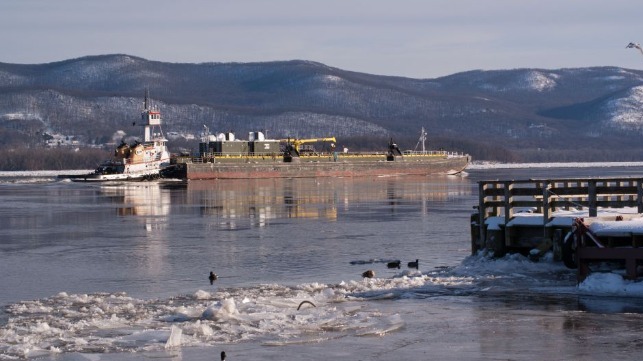Op-Ed: Banning Anchoring on the Hudson Would be Unsafe

What if there was a major U.S. highway where you were never allowed to pull over, even for safety reasons? That highway would be far less safe, for everyone who used it.
If Congress doesn’t act, the Hudson River – a 153-mile stretch of vital marine highway – will also become far less safe, with vessel operators prohibited from anchoring nearly everywhere on the river, even to protect human life, the environment, and neighboring communities.
The Coast Guard and the marine industry have long agreed on the critical importance of anchorages on the Hudson River, where over 13 million tons of cargo is transported annually. In 2016, motivated by this common understanding, the Coast Guard drafted a proposed regulation to establish additional federally designated anchorages on the Hudson – located where vessel operators had been safely anchoring for decades. In the face of well-intentioned but misinformed opposition led by environmental groups, the Coast Guard later withdrew its rulemaking.
In 2023, the Coast Guard issued a report to Congress reaffirming the importance of anchorages to support safe navigation on the Hudson. This time, the Coast Guard did not propose establishing additional anchorages, but rather rescinded its previous prohibition on anchoring outside federally designated anchorage areas, sensibly allowing towing vessel captains and pilots to anchor, when necessary.
Disregarding the Coast Guard’s judgment on navigational safety, New York Congressmen Ryan and Molinaro responded by inserting language into the House of Representatives’ Coast Guard Authorization Act of 2024 that effectively prohibits vessel operators from anchoring on the Hudson River.
If allowed to stand, this prohibition will create serious safety, environmental and economic risks.
The Coast Guard’s 2023 report to Congress was developed in part through consultation with the Hudson River Safety, Navigation, and Operations Committee (HRSNOC). The HRSNOC was established by the Coast Guard in 2018 to include a broad range of Hudson River waterfront, recreational, and commercial users. The report emphasized what generations of commercial mariners know to be true: “Anchorages are an essential part of navigational safety.” When river conditions become unsafe for navigation - for reasons of weather, ice, vessel traffic congestion, lack of available safe berthing, crew fatigue, or mechanical casualty - it is vital for the safety of the crew and for all surrounding waterways users that the captain has the discretion to anchor the vessel, out of the way of river traffic, until it is safe to proceed. This practice has served mariners and Hudson River communities well for centuries, as the Coast Guard report notes: “The Coast Guard is not aware of any incidents within the study area of collisions or other marine casualties related to imprudent commercial vessel anchoring.”
And notwithstanding opponents of anchorages claiming they are seeking to protect the environment on the Hudson River, the freedom to anchor is itself critical to environmental protection. If vessels are forced to continue navigating, instead of “pulling over” and anchoring, despite facing dangerous conditions, the risk of accidents, including those that could harm the river’s ecosystem, increases substantially. When navigating in such a situation, vessels may have to navigate at reduced speed, and possibly with reduced maneuverability, contributing to negative consequences of increased emissions and river congestion.
It should also be considered that navigating on such a dynamic waterway for a significant period of time can present unforeseen hazards. Over the course of navigating the 153-mile waterway, which can easily exceed 24 hours, weather and waterway forecasts can change significantly. To reduce the risk of these hazards, as part of a required navigation risk assessment, anchoring is considered a priority mitigation consideration.
On top of creating safety and environmental risks, prohibiting anchorages on most of the Hudson River can detrimentally impact the supply chain as well. Preventing anchoring threatens the safe transport of vital cargo that households and businesses need – not only consumer goods, but also transportation of energy sources, construction materials, and other building blocks of the local economy that support families and livelihoods, both in the Hudson Valley and beyond to western portions of New England. Additionally, the region has become a significant supporter of green initiatives, notably the transportation of wind energy components – most of which are delivered by marine operators navigating the Hudson River.
The safety, environmental and supply chain risks that come with prohibiting anchorages are not unique to the Hudson River. There is real danger that leaving this prohibition in place will set a precedent for similar restrictions on critical waterways elsewhere in the United States, with serious implications for safe and efficient commercial and recreational navigation.
The Coast Guard authorization bill, having passed the House of Representatives, is now before the Senate Commerce Committee, which will have the opportunity to amend the bill before it moves to a full Senate vote. As part of a coalition of maritime leaders, with centuries of experience operating on the Hudson River, my company has joined our colleagues in urging Chairwoman Maria Cantwell (D-Washington) and Ranking Member Ted Cruz (R-Texas) to remove this language from the bill and keep commerce moving safely through the Hudson Valley.
Our industry is proudly the safest, most sustainable and efficient mode of freight transportation in the United States, strongly committed to continuous improvement and innovation. We move forward confidently by knowing our past, and the lessons we have learned that are still relevant today. That is why we implore Congress to avoid making the Hudson River unsafe for mariners, residents, and the environment.

that matters most
Get the latest maritime news delivered to your inbox daily.
Captain Nathan Hauser is Regional Vice President, Northeast at Moran Towing Corporation and serves as Atlantic Region Chairman of the American Waterways Operators.
Top image: Barge on the Hudson at Newburg Bay (Fran Trudeau / CC BY SA 2.0)
The opinions expressed herein are the author's and not necessarily those of The Maritime Executive.
